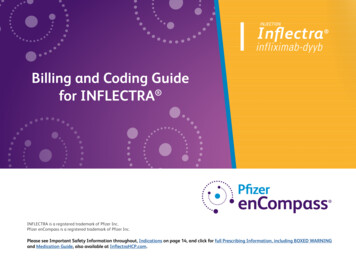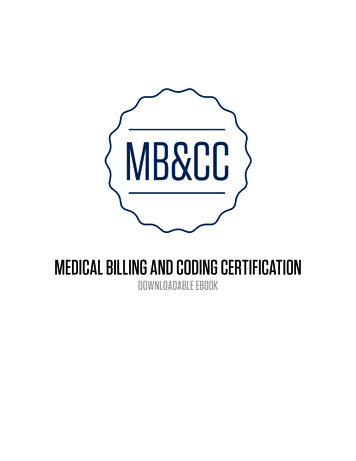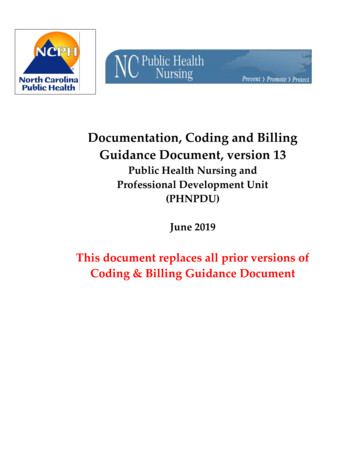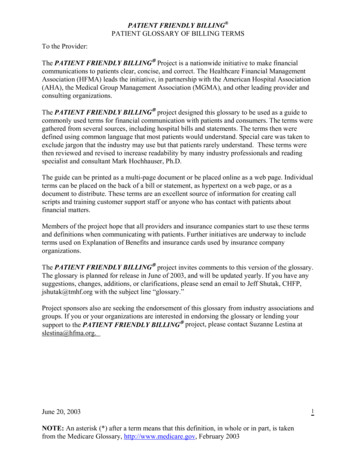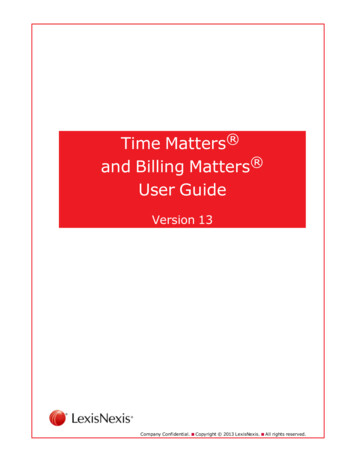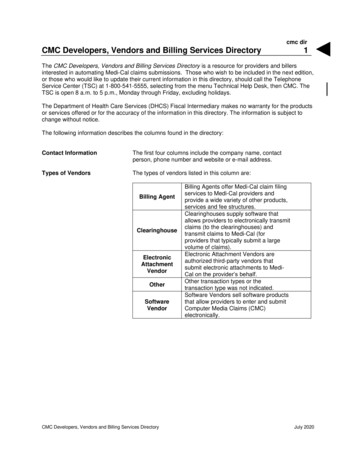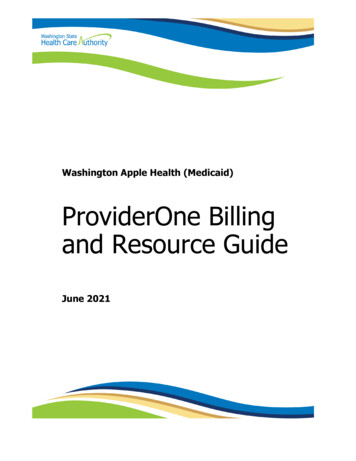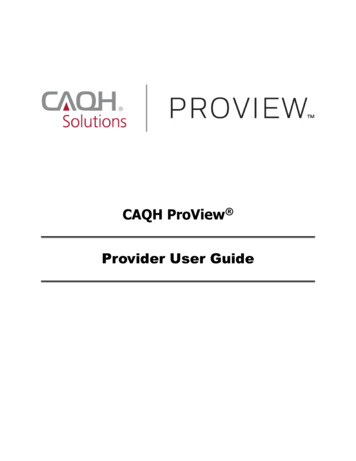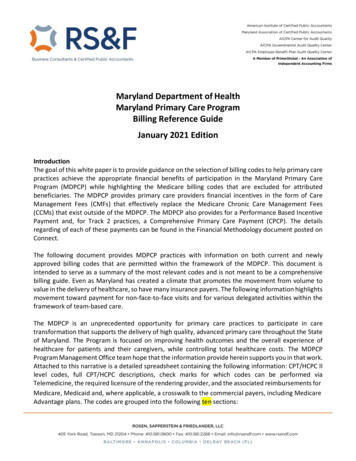
Transcription
Maryland Department of HealthMaryland Primary Care ProgramBilling Reference GuideJanuary 2021 EditionIntroductionThe goal of this white paper is to provide guidance on the selection of billing codes to help primary carepractices achieve the appropriate financial benefits of participation in the Maryland Primary CareProgram (MDPCP) while highlighting the Medicare billing codes that are excluded for attributedbeneficiaries. The MDPCP provides primary care providers financial incentives in the form of CareManagement Fees (CMFs) that effectively replace the Medicare Chronic Care Management Fees(CCMs) that exist outside of the MDPCP. The MDPCP also provides for a Performance Based IncentivePayment and, for Track 2 practices, a Comprehensive Primary Care Payment (CPCP). The detailsregarding of each of these payments can be found in the Financial Methodology document posted onConnect.The following document provides MDPCP practices with information on both current and newlyapproved billing codes that are permitted within the framework of the MDPCP. This document isintended to serve as a summary of the most relevant codes and is not meant to be a comprehensivebilling guide. Even as Maryland has created a climate that promotes the movement from volume tovalue in the delivery of healthcare, so have many insurance payers. The following information highlightsmovement toward payment for non‐face‐to‐face visits and for various delegated activities within theframework of team‐based care.The MDPCP is an unprecedented opportunity for primary care practices to participate in caretransformation that supports the delivery of high quality, advanced primary care throughout the Stateof Maryland. The Program is focused on improving health outcomes and the overall experience ofhealthcare for patients and their caregivers, while controlling total healthcare costs. The MDPCPProgram Management Office team hope that the information provide herein supports you in that work.Attached to this narrative is a detailed spreadsheet containing the following information: CPT/HCPC IIlevel codes, full CPT/HCPC descriptions, check marks for which codes can be performed viaTelemedicine, the required licensure of the rendering provider, and the associated reimbursements forMedicare, Medicaid and, where applicable, a crosswalk to the commercial payers, including MedicareAdvantage plans. The codes are grouped into the following ten sections:
1. Wellness and Preventive Services: This code section includes the Medicare benefits forWellness Visits. There is an initial ‘Welcome to Medicare’ Wellness Visit (IPPE) which maybe reported with a separately billable ECG, followed by initial and subsequent AnnualWellness Visits (AWV). These benefits are limited by timing and frequency. The IPPE iscovered once in a beneficiary’s lifetime within the first 12 months of Medicare Part Benrollment. The initial AWV is also a once in a lifetime benefit eligible 12 months followingthe IPPE. Subsequent AWV’s are covered every 12 months thereafter. The purpose of thesevisits is to identify health and social risk factors by means of a review of medical and socialhistories, screening tests and risk assessments resulting in the referral of treatment and awritten personal prevention plan. Depression screening and health risk assessmentservices that are separately covered by Medicare are not reported on the same day as theAWV. These visits do not include comprehensive routine physical exams (99391‐99397).Routine physicals are not covered by Medicare but may be billed to supplementaryinsurance, Medicare Advantage plans, commercial payers or directly to the patient as theircoverage allows. Many Medicare Advantage plans cover the Medicare wellness codes andthe routine physicals separately. These codes may be reported on the same day asproblem‐oriented visits, if performed. Additional AWV billing guidance can be found wnloads/AWV Chart ameworkForHRA.pdfA complete interactive tool for all additional preventive services covered by Medicare canbe found uickReferenceChart‐1.html2. Transitional Care Management (TCM) Services: This section includes the codes that arereported to obtain significant reimbursement for managing a patient’s transition followingdischarge from an acute care facility. This includes an interactive contact and a face‐to‐facevisit during the 30 day transition period. Acute care facilities include but are not limited tohospitals, rehabilitation facilities and skilled nursing facilities as the patient is beingdischarged back to the community setting, e.g., home, domiciliary care, rest home orassisted living. TCM benefits are based on timing and the sequence of services performed
and documented. The provider or a clinical staff member must initiate the interactivecontact (telephone, email or in person) with the patient or caregiver within two (2)business days following the discharge date. Medication reconciliation should bedocumented during that communication and/or an attempt made to reconcilemedications. Reimbursement levels are based on the timing of the face‐to‐face visit andthe level of medical decision‐making. This service may be billed on the date of the face‐to‐face visit and need not wait until the end of the 30‐day transition period. Only one providermay bill the service per patient, and it is excluded from a surgeon’s postoperative care (allsurgical patients should be followed by their primary care provider). Do not bill for homehealth care plan oversite during this time period as it will cause the TCM care to deny as“duplicative.” Clinical staff under the direction of the provider may furnish additional non‐face‐to‐face services such as: Communicate with agencies and community services the beneficiary uses Provide education to the beneficiary, family, guardian, and/or caretaker to supportself‐management, independent living, and activities of daily living Assess and support treatment adherence and medication management Identify available community and health resources Assist the beneficiary and family in accessing needed care and services A complete guide to documentation and billing for transitional care service can be found s‐Fact‐Sheet‐ICN908628.pdf3. Complex and Noncomplex Chronic Care Management (CCM): This section contains thecodes that are excluded from reporting to Medicare while enrolled in the MDPCP program.However, they are billable to Medicare Advantage and commercial payers. They are notcovered under the Maryland Medicaid program. These codes provide reimbursement for non‐face‐to‐face time spent by clinical staff and/or physicians and Qualified Healthcare Provider (QHP) formanaging the care of patients with two or more chronic conditions. These conditions are expectedto last at least 12 months and place the patient at significant risk of death, acuteexacerbation/decompensation or functional decline. The work includes establishing,implementing, revising or monitoring a comprehensive care plan. The benefit is based on theamount of time accumulated during a calendar month spent on the CCM activities for the patient.The levels of reimbursement correspond to the amount of time spent and the level of complexity ofmedical decision making. Examples of chronic conditions include but are not limited to thefollowing: Alzheimer’s disease and related dementia
Arthritis (osteoarthritis and rheumatoid) Asthma Atrial fibrillation Autism spectrum disorders Cancer Cardiovascular Disease Chronic Obstructive Pulmonary Disease Depression Diabetes Hypertension Infectious disease Substance abuse CCM services include INR management, self‐management education, telephone assessmentand management discussions and other patient care supervision that is often not separatelyreimbursable. Do not report CCM services in the same calendar month as TCM services. Patientconsent is required for billing including informing the patient that only one practitioner canfurnish and be paid for the service. Obtaining the patient’s signature to consent to the plan ofcare increases patient compliance.Effective January 1, 2021, there are revisions to the current coding nomenclature for thesecodes that specify the time range associated with the codes and clarify that these services maynow be performed by clinical staff directed by the physician or QHP. New codes were added toreport extended time spent in chronic care management during the calendar month.A complete guide to CCM services and additional resources can be found wnloads/ChronicCareManagement.pdfCareFirst provides significant reimbursement and support to providers in Patient CenteredMedical Homes (PCMH) who activate an eligible patient’s care plan through the CareFirstProvider Portal.Additional CareFirst PCMH details can be found t‐pcm1028.pdf4. Behavioral Health Intervention/Assessment: This section includes the codes that are usedto describe services that are intended to assess factors that may affect the recovery orprogression of a diagnosed physical health problem or illness. These procedures identify
the psychological and social factors that influence the patient’s physical health problem.The focus is not mental health and should not be reported if the patient has a mental healthdiagnosis. These services are payable under Medicare to a clinical psychologist. Thesecodes are not to be used by physicians, non‐physician providers (NPP) or clinical socialworkers. Physicians and NPPs should report this type of service with evaluation andmanagement (E/M) codes. January 1, 2020 CPT added an entire set of new codes to reportthese services and has deleted codes 96150‐96154. The new code set has changed thetime references for coding these services. The health behavior assessment service is nolonger time based (CPT 96156). The health behavior intervention services now have aninitial base time of 30 minutes with an add‐on code for each additional 15 minutes. And,two additional codes were added to report health behavior intervention services providedto a family. Furthermore, CPT did not designate that the code set effective January 1, 2020was a telemedicine eligible code and CMS did not include the new code set to their list ofcovered telemedicine codes for 2020 which was published in 2019. As of March 30, 2020CMS has added these services to the list of expanded telehealth eligible service in the wakeof the COVID‐19 emergency.Additional information regarding these codes can be found �database/lcd attachments/30514 1/l30514 031610 cbg.pdf5. Chronic Care Remote Patient Monitoring (RPM) – This section includes the codes that areused to report non‐face‐to‐face evaluation and management services and health datamonitoring. Medicare now covers a ‘virtual check‐in’ which can be a telephone call.Because these services are inherently non face‐to‐face they are not classified as telehealthservices. G2012 is reported to obtain reimbursement for a telephone call to evaluate andmanage a patient’s condition(s) in lieu of an office visit. G2010 is reported to obtainreimbursement for evaluation of recorded video and/or still images submitted by anestablished patient (i.e., store and forward), including interpretation and follow‐up withthe patient. Both codes are payable when the service does not arise from a face‐to‐facevisit in the last 7 days or results in the need to schedule an office visit at the soonestavailability.There are four (4) additional codes for reimbursement when a physician or other QHP ordersan FDA‐defined remote patient monitoring (RPM) device that is used by a patient for thepurposes of collecting, monitoring, and reporting health‐related data to the provider, including,but not limited to, weight, blood pressure, or pulse oximetry. This technology allows for thegathering of health data from the patient in one location and the electronic transmission of thatdata to a provider in a different location for review and subsequent recommendations,
particularly for patients with ongoing and/or chronic disease processes. Code 99453 reports thework involved in orienting the patient to the RPM process, the initial device set‐up, and thepatient instruction and training for each episode of care. An episode of care is described asstarting at the time the RPM device service begins and is complete when the establishedtreatment goal has been reached. Code 99454 reports the supply of the actual device, includingthe daily recordings and program alert transmissions for a 30‐day period. These codes shouldnot be reported for monitoring if the duration is less than 16 days. Code 99457 is reported toidentify time spent managing care when the patient or the practice does not meet requirementsfor reporting a more specific service. This code may be reported simultaneously with chroniccare management, transitional care management, and behavioral health integration services.Time involved in performing this service should remain separate and distinct from otherservices and does not count toward the required time for both services in a single month. Liveand interactive communication with the patient and/or caregiver is required with 20 minutesor more of clinician time per calendar month. Code 99457 should be reported only once percalendar month regardless of the number of physiologic monitoring modalities performed.Effective January 1, 2020 CPT revised the definition of 99457 to report the first 20 minutes ofthe service and added the CPT code 99458 to report each additional 20 minutes to obtainreimbursement for extended times. CPT also added codes 99473 and 99474 to reportmonitoring patients’ self measured blood pressure. Codes 99473 and 99474 are bundled intochronic care management services and can only be reported separately.Effective January 1, 2021, Medicare has qualified that clinical staff may perform and documentthese services (CPT 99453 and 99454) under the direction of a physician or QHP. EffectiveJanuary 1, 2021 Medicare will accept code G2252 to report a “virtual check‐in” extending to aduration of 11‐20 minutes. Additional discussion of these codes can be found imbursement‐fa6. Advance Care Planning (ACP): This section includes the codes that provide reimbursementfor time spent discussing advance directives with a patient, family member, or surrogatewith or without completing relevant forms. This is a face‐to‐face visit with a physician orQHP. ACP may include discussion of goals and preferences for care, complex medicaldecision‐making regarding life‐threatening or life‐limiting illness, explanation of relevantadvance directives, including (but NOT requiring) completion of advance directives. Anadvance directive is a document in which a patient appoints an agent and/or records thewishes of a patient pertaining to their medical treatment at a future time if they cannotdecide for themselves. This service is not limited to frequency as over time, directives maychange or there is a need to engaging family members, and/or surrogate decision makers,as clinical situations arise. The level of benefit is based on the amount of time spent in
discussion which should be separately documented. A minimum of 16 minutes must bedocumented to bill for the first 30 minutes. A minimum of 46 minutes must be documentedto bill for an additional 30 minutes. Time may be documented as start and stop time or thetotal duration. This service may be reported on the same day as the AWV and whencovered on that day there is no cost sharing to the patient. If the service is reported aloneor on the same day as an E/M service, the patient should be informed that cost sharing willapply. Additional details may be found wnloads/AdvanceCarePlanning.pdf7. Behavioral Health Integration (BHI) Services: This section includes the three (3) codes thatprovides separate reimbursement to physicians and NPPs for the BHI services they furnishto beneficiaries over a calendar month service period. There are two (2) models of careunder which these services are provided. The first is the Psychiatric Collaborative CareModel (CoCM). Psychiatric collaborative care management services describe care reportedby a qualified clinician overseeing a behavioral health care manager and psychiatricconsultant who provides a behavioral health assessment, including establishing, starting,revising, or monitoring a plan of care as well as providing brief interventions to a patientdiagnosed with a mental health disorder. The psychiatric consultant contracts directly withthe qualified clinician to render the consultation portion of the service. Patients aregenerally referred to a behavioral health care manager for assistance in receivingtreatment for newly diagnosed conditions that have been unresponsive to traditional orstandard care provided in a non‐psychiatric environment or who need additionalexamination and evaluation before a referral to a psychiatric care setting. In 99492, therequired elements include outreach and engagement, initial patient assessment thatinvolves the administration of a validated rating scale, development of an individual patientcare plan, psychiatric consultant review and modifications as needed, input of patient datainto a registry and tracking of patient progress and follow up and provision of briefinterventions using evidence‐based techniques. In 99493, the required elements includetracking patient follow‐up and progress via registry, weekly caseload participation with apsychiatric consultant, working together and coordinating with the qualified clinician on aregular basis, additional ongoing review of the patient's progress and recommendationsfor treatment changes, including medications with the psychiatric consultant, provision ofbrief interventions with the use of evidence‐based techniques, monitoring patientoutcomes using validated rating scales and relapse prevention planning. Episodes of carebegin when the patient is first directed to the behavioral health care manager and endswhen the treatment goals have been reached or the goals were not reached and the
patient was referred to another provider for ongoing treatment, or no psychiatriccollaborative care management was provided for a period of six consecutive months. Thesecodes do not differentiate between new or established patient status. Report 99492 for 70minutes of initial psychiatric collaborative care management in the first month; 99493 for60 minutes of care in a subsequent month; and 99494 for each additional 30 minutes ofinitial or subsequent care in a calendar month.General behavioral health integration care management services (99484) are provided face‐to‐face by clinical staff under the direct supervision of a qualified clinician, to a patient witha diagnosed health care condition including substance abuse issues requiring caremanagement services for a minimum of 20 minutes per month. Specific elements of atreatment plan must be provided and documented, including an initial assessment orfollow‐up monitoring involving the use of validated rating scales, behavioral health careplanning relating to the patient's behavioral or mental health problems with revisions incases where a patient is not responding to treatment
approved billing codes that are permitted within the framework of the MDPCP. This document is intended to serve as a summary of the most relevant codes and is not meant to be a comprehensive billing guide. Even as Maryland has cr
